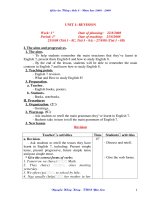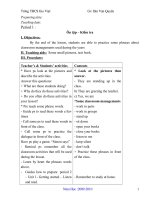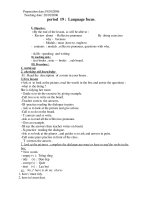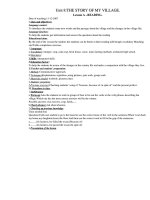Gián án TA 8 10-11
Bạn đang xem bản rút gọn của tài liệu. Xem và tải ngay bản đầy đủ của tài liệu tại đây (147.74 KB, 13 trang )
Week: 21 preparing date: 4 / 1/ 2011
Period: 63 Teaching date: 7 /1/ 2011
Unit 10: RECYCLING
Getting started & Listen and read
I/ Objectives :
By the end of this lesson, Ss will be able to talk about the environment problems
and they can do some things to protect the environment.
Teach ss to protect and keep entertainment green and clear.
Improve listening, speaking and reading.
II/ Language focus :
1. Grammar: passive form, making advices, It’s + adj + to(inf)
2. Vocabulary:
wrap, fertilizer, reduce, package, overpackage, recycle.
III Methods and techniques:
Communicative approach, audio-lingual, pair/group work.
IV/ Teaching aids : Pictures, sub-board.
V/ Procedures:
1. Greeting.
2. New lesson:
Activities Contents
Warm up
Ask ss to think of ways to reduce the
amount garbage they produce.
Divide the class into 4 groups. Each
group has a poster.
The groups put their posters on the
board when they finish. Which group
has the best ideas is the winner.
Presentation:
Set the scene: A representative from
Friends of the Earth, Miss Blake, is
talking to ss of Quang Trung School.
Friends of the Earth shows people how
to protect the environment and save
natural resources.
T: Asks the students to listen to the
I/ Getting started:
Brainstorm:
reuse plastic bags
tree leaves to wrap things
1. Pre - teach vocabulary:
recycle (v) (translation)
fertilizer (n) (translation)
wrap (v) (synonym) = to package
representative (n) (translation)
reduce (v) (antonym) ≠ rise
package (v) (translation) .
Ways to reduce the
amount of garbage
tape
T explains some new words.
Ss practice the words.
Ask ss to read the dialogue again, then
do the exercise.
Ss work in groups to do.
Ask some groups to give their
answers.
Give feedback.
T. explains grammar points.
Practice:
Ss: Practice the dialogue in pairs.
Ask some pairs to practice in front of
class.
T: Corrects pronunciation.
Ask ss to read the dialogue again, then
answer the questions.
T. asks some questions. Ss answer
Ss work in pairs to ask and answer.
Production
T. writes the topic on the board. Ss
work in groups to discuss.
2. True or False statements:
a. Friends of the Earth is an organization
to help people make friends with each
other.
b. Miss Blake asks the ss to remember 3
things: reduce, reuse, recycle.
c. Reduce means buying the products
which are overpackaged.
d. We can’t reuse things like envelopes,
glass, plastic bottle, old plastic bags.
Key: a. F b. T c. F d. F
Grammar:
Adj + to (inf)
Ex: It is not difficult to remember
because all the three words begin with
the letter R.
Adj + that clause
Ex: I am pleased that you want to know
more.
3. Answer the questions
a. Reduce means not buying products,
which are overpackaged.
b. We can reuse things like envelopes,
glass, plastic bottles, old plastic bags.
c. Recycle means not throwing things
away. Try to find another use for them.
d. We can contact with an organization
like Friends of the Earth for information
on recycling.
Discussion:
How to protect our environment?
3. Homework:
- Learn by heart new words. Practice the dialogue again. Make a list of the ways
to protect the environment.
- Prepare unit 10 – Section SPEAK
Self - evaluation:
..................................................................................................................................
..................................................................................................................................
..................................................................................................................................
Week : 22 Preparing date: 8 /1 / 2011
Period: 64 Teaching date: 10 /1 / 2011
Unit 10: RECYCLING
Speak
I/ Objectives:
By the end of this lesson, Ss will be able to give and respond to instructions
teach Ss to do some things to save natural resources.
Improve speaking, listening and writing skills
II/ Language focus:
1. Grammar: give and respond instructions.
2. Vocabulary: fabric, leather, fertilize, compost, belong to
III/ Techniques: Communicative approach, Audio-lingual, pair works
IV/ Teaching aids: Sub-board, textbook
V/ Procedures:
1. Greeting:
2. New lesson:
Activities Contents
Warm up:
Show the picture to the ss and ask
them observe it carefully, let ss
look at the picture about 15’’ then
put it away.
Divide class into two team, ss
from each team write words show
things in the picture.
(one by one writes)
Pre-speaking:
Pre-teach vocabulary:
T. explains new words
Set the scene: Look at the picture.
we have to recycle it. what must
we do before recycling?
yes, you have to kind it into
groups.
Memory game:
Possible answer:
used paper, old newspaper, books, glasses,
jars, plastic bags, cans, drinking tins,
vegetables matter,bottles, ...
1. Vocabulary:
fabric (n) ( real thing)
compost (n) Explanation) It is made from
vegetables matter to fertilize on the field.
leather (n) (real thing)
to fertilize (v) (translation)
belong to (v) (translation)
While – speaking
Ask ss to work in groups of four
to practice orally.
Ask some groups to practice in
front of class.
T remarks and gives marks.
Post-speaking
Ask ss to work in groups to make
the sentences.
Ask ss to practice.
2. Divide the garbage into groups:
fabric, vegetables matter, glasses, plastic
tins
Nam: Which group do clothes belong to?
Lan: Put them in “fabric”.
Nam: What can we do with those clothes?
Lan: We can recycle them and make them
into paper or shopping bags.
Nga: Is fruit “vegetables matter”?
Hoa: That’s right.
Nga: What will we do with it?
Hoa: We make it into compost and fertilize
our field.
Group of tins: to make other things
Group of glasses: to make bottles or other
glasses.
3. Write it-up:
a. we/recyle/bottles/cans/other things.
b. we/make/ vegetables/fruit/compost.
c. people/should/reuse/plastic bags.
Homework:
Write the dialogues on their books. Do the exercises unit 10 - section 1,2.
Prepare unit 10 - section Listen
Self-evaluation:
..................................................................................................................................
..................................................................................................................................
..................................................................................................................................
..................................................................................................................................
Week: 22 Preparing date: 9 /1 /2011
Period: 65 Teaching date: 12 /1 /2011
Unit 10: RECYCLING
Listen & Language focus 4
I/ Objectives:
- By the end of the lesson, students will be able to answer the questions by
listening and further practice in passive voice form.
- Teach ss to know more some activities to save environment
- Develop listening and speaking skills.
II/ Language focus :
1/ Grammar: passive form
2/ Vocabulary: detergent liquid, shape, melt, heap, grain, rat, shovel,
moisture, condensation
III/ Methods and techniques:
Communicative approach, audio-lingual, pair works
IV/ Teaching aids: Sub boards, tape, pictures
V/ Procedures:
1. Greeting:
2. New lesson:
Activities Contents
Warm-up:
Divide the class into 4 teams. Each
team receives a sub-board written
the table. Ss discuss then match.
The team, Which has sentences
that are more correct is winner.
Pre - listening
pre-teach vocabulary
Set the scene: A Representative is
talking about how to do compost.
Matching:
Group Items
Glass us used paper,
newspapers
Metal plastic bags, bottles
Fabric bottles, glasses, jars
Leather food cans, tins
Vegetable
s matter
clothes
Paper fruit peels, vegetables
Plastic shoes, sandals
1. Vocabulary:
heap (n) (explanation )
grain (n) (real thing)
rat (n) (picture)









